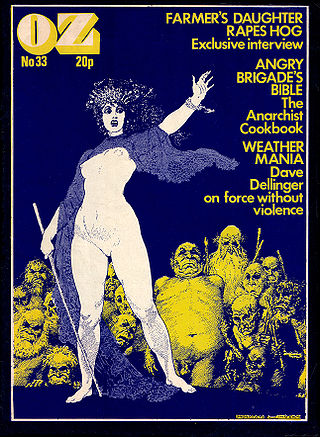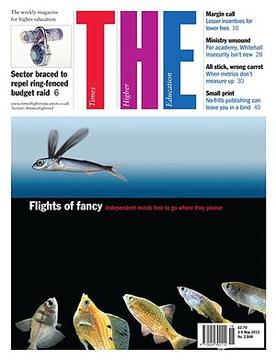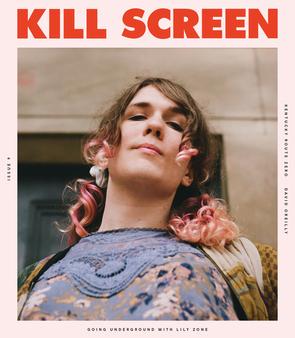A fanzine is a non-professional and non-official publication produced by enthusiasts of a particular cultural phenomenon for the pleasure of others who share their interest. The term was coined in an October 1940 science fiction fanzine by Russ Chauvenet and first popularized within science fiction fandom, and from there the term was adopted by other communities.

National Lampoon was an American humor magazine that ran from 1970 to 1998. The magazine started out as a spinoff from the Harvard Lampoon. National Lampoon magazine reached its height of popularity and critical acclaim during the 1970s, when it had a far-reaching effect on American humor and comedy. The magazine spawned films, radio, live theater, various sound recordings, and print products including books. Many members of the creative staff from the magazine subsequently went on to contribute creatively to successful media of all types.

Amazing Stories is an American science fiction magazine launched in April 1926 by Hugo Gernsback's Experimenter Publishing. It was the first magazine devoted solely to science fiction. Science fiction stories had made regular appearances in other magazines, including some published by Gernsback, but Amazing helped define and launch a new genre of pulp fiction.

The Harvard Crimson is the student newspaper of Harvard University and was founded in 1873. Run entirely by Harvard College undergraduates, it served for many years as the only daily newspaper in Cambridge, Massachusetts. Beginning in the fall of 2022, the paper transitioned to a weekly publishing model.

Asimov's Science Fiction is an American science fiction magazine which publishes science fiction and fantasy named after science fiction author Isaac Asimov. It is currently published by Penny Publications. From January 2017, the publication frequency is bimonthly.
"The British Poetry Revival" is the general name given to a loose poetry movement in Britain that took place in the 1960s and 1970s. The revival was a modernist-inspired reaction to the Movement's more conservative approach to British poetry. The poets included an older generation - Bob Cobbing, Paula Claire, Tom Raworth, Eric Mottram, Jeff Nuttall, Andrew Crozier, Lee Harwood, Allen Fisher, Iain Sinclair—and a younger generation: Paul Buck, Bill Griffiths, John Hall, John James, Gilbert Adair, Lawrence Upton, Peter Finch, Ulli Freer, Ken Edwards, Robert Gavin Hampson, Gavin Selerie, Frances Presley, Elaine Randell, Robert Sheppard Paul Evans Adrian Clarke, Clive Fencott, Maggie O'Sullivan, Cris Cheek, Tony Lopez and Denise Riley.

Horace Mann School is a private, independent college-preparatory school in the Bronx, founded in 1887. Horace Mann is a member of the Ivy Preparatory School League, educating students from the New York metropolitan area from nursery school to the twelfth grade. The Upper, Middle, and Lower Divisions are located in Riverdale, a neighborhood of the Bronx, while the Nursery School is located in Manhattan. The John Dorr Nature Laboratory, a 275 acres (111 ha) campus in Washington Depot, Connecticut, serves as the school's outdoor and community education center. Tuition for the 2021–22 school year from pre-kindergarten through grade twelve is $57,200 per annum, not including some additional fees, one of which exceeds $1,000. The 2020 Niche survey ranked HM as the 3rd best K–12 private school in the country and the 12th best private high school in the country.

Oz was an independently published, alternative/underground magazine associated with the international counterculture of the 1960s. While it was first published in Sydney in 1963, a parallel version of Oz was published in London from 1967. The Australian magazine was published until 1969 and the British version until 1973.

A student publication is a media outlet such as a newspaper, magazine, television show, or radio station produced by students at an educational institution. These publications typically cover local and school-related news, but they may also report on national or international news as well. Most student publications are either part of a curricular class or run as an extracurricular activity.
Dotmusic was a music webzine that existed as a standalone website from 1 June 1995 to December 2003. Initially intended as the web complement to the UK music industry trade magazine Music Week, the site was relaunched in December 1998 as a website for music fans with features, interviews and the UK charts. The site was edited by Andy Strickland and among its most prominent writers were Nimalan Nadesalingam who contributed artist biographies and James Masterton who contributed a weekly UK chart commentary. After an internship in summer 2000, Alex Donne Johnson used his experience at Dotmusic to go on and found the urban music website RWDmag, which later become one of the key players in the development of grime, UK garage and dubstep online.

Fast Company is a monthly American business magazine published in print and online that focuses on technology, business, and design. It publishes six print issues per year.
Go-Set was the first Australian pop music newspaper, published weekly from 2 February 1966 to 24 August 1974, and was founded in Melbourne by Phillip Frazer, Peter Raphael and Tony Schauble. Widely described as a pop music "bible",

Oriental Stories, later retitled The Magic Carpet Magazine, was an American pulp magazine published by Popular Fiction Co., and edited by Farnsworth Wright. It was launched in 1930 under the title Oriental Stories as a companion to Popular Fiction's Weird Tales, and carried stories with far eastern settings, including some fantasy. Contributors included Robert E. Howard, Frank Owen, and E. Hoffman Price. The magazine was not successful, and in 1932 publication was paused after the Summer issue.
New Yorkshire Writing was a British literary quarterly which briefly gained one of the largest circulations of what is commonly called a "little magazine", distributed as a supplement in 13,000 copies of The Month In Yorkshire, the arts listings magazine then published by the Yorkshire Arts Association (YAA). It had an estimated readership of 45,000 according to an announcement by YAA's Director Michael Dawson. He proposed in a launch press release that the magazine's distribution method "would bring serious creative fiction and poetry to a much larger and more varied audience than usual". All contributors were to be paid, something that only a handful of British little magazines were able to do.
Rolling Stone Australia is the Australian edition of the United States' Rolling Stone magazine devoted to music, politics, and popular culture, published monthly. The Australian version of Rolling Stone was initially published in 1970 as a supplement in Revolution magazine published by Monash University student Phillip Frazer. It was launched as a fully fledged magazine in 1972 by Frazer and was the longest surviving international edition of Rolling Stone until its last issue appeared in January 2018.

Times Higher Education (THE), formerly The Times Higher Education Supplement, is a British magazine reporting specifically on news and issues related to higher education.

Kitsch is a semesterly magazine produced by students of Cornell University. It prints feature journalism, fiction, opinions, art, and miscellaneous shorter pieces; one of its taglines reads: "Where fact and fiction meet." The relatively unrestricted scope of the publication ensures that any thought-provoking topic may be considered for a feature.
Objectivist periodicals are a variety of academic journals, magazines, and newsletters with an editorial perspective explicitly based on Ayn Rand's philosophy of Objectivism. Several early Objectivist periodicals were edited by Rand. She later endorsed two periodicals edited by associates, and a number of others have been founded since her death.

During the ten decades since its establishment in 1919, the Communist Party USA produced or inspired a vast array of newspapers and magazines in the English language.

Kill Screen was a print and online magazine founded in 2009 by Jamin Warren and Chris Dahlen and owned by Kill Screen Media, Inc. It focused on video games and culture, but also included articles based on entertainment. The name is based on the video game term of the same name.












